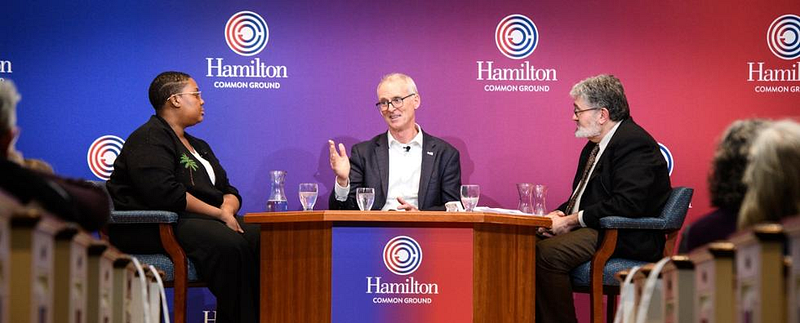
Both Gunn-Wright and former Rep. Inglis agreed on the urgency of the climate change crisis. Photo courtesy of Nancy L. Ford.
Common Ground hosted its first discussion of 2024 with Rhiana Gunn-Wright, the Climate Policy Director at the Roosevelt Institute, and former U.S. Representative Bob Inglis this past Thursday, Jan. 31, in the Chapel. The discussion was moderated by Chair and Professor of Government Peter Cannavò.
Cannavò began the discussion by asking the two guests how they became passionate about climate change, their approaches to the issue and the seriousness of the climate crisis.
Gunn-Wright answered Cannavò’s question first by discussing her background in policy work. The Roosevelt Institute Climate Policy Director explained how her early career policy work focused on poverty and inequality. Gunn-Wright’s policy work gradually shifted to a focus on environmental justice, which she credits to her political campaign work. She explained how she worked on an epidemiologist’s gubernatorial campaign in Michigan who spoke publicly about the public social detriment of health and how climate change disproportionately affects minority communities.
Gunn-Wright’s candidate lost in the primaries, but her work on the campaign led to her to be invited to co-author the Green New Deal alongside U.S. Representative Alexandria Ocasio-Cortez. Gunn-Wright explained that the Deal works not just to address climate change as an environmental crisis, but also how climate change affects the economy and energy systems. In doing so, the Deal seeks to build a long-term social safety net for Americans.
Gunn-Wright also stressed how everything is connected to the fossil fuel industry, from the asthma prevalent among underrepresented communities to the fabrics we wear everyday. Additionally, she argued that “white supremacy is able to use the fossil fuel industry without limit because you can dump the worst parts of production and extraction onto the communities with the least power.”
Inglis acknowledged that during his first six years in Congress in the 1990s, he believed that climate change was nonsense. However, when Inglis ran for Congress again in 2004, his eldest son told his father that he had to start advocating for the environment while in office.
The Republican politician also reflected on the time when he went snorkeling with an Australian climate scientist. During their endeavor, Inglis learned that the scientist was making conservation changes in his life to further his love for God and people. Inglis realized that he and the climate scientists shared a belief in God, leading the former Representative to become more passionate about the intersection between climate science and religion.
While in Congress, Inglis introduced the Raise Wages, Cut Carbon Act of 2009. The proposed Act failed because one, a carbon tax during the Great Recession was unappealing to many Americans and two, he represented an extremely conservative district in South Carolina. While Inglis asserts that climate change is real, he has found that the Tea Party Conservatives, that emerged in 2009, believe that the idea that climate change is real to be heresy.
Even though his climate efforts in Congress failed, Inglis went on to start republicEN.org for conservatives who care about climate change. Inglis is also in favor of carbon taxes to hold people accountable for their carbon emissions.
Gunn-Wright and Inglis agreed that the climate crisis is an emergency and needs to be urgently addressed.
Inglis reflected on three ways to address climate change: regulating carbon emissions, incentivizing clean energy and pricing in the negative effects of burning fossil fuels. The former Representative argued that regulating carbon emissions is possible in America through policy. However, America cannot regulate Chinese emissions and China is the number one producer of carbon emissions.
Inglis then presented a system to incentivize clean energy using a hypothetical situation: power lines could be constructed in mid-western states, like Kansas, which would power major cities, like Chicago. The latter would then pay Kansas farmers whose land is being used for the power lines, incentivizing the Kansas farmers to allow greater development of clean energy on their property. Inglis concluded his remarks by reasserting the power of carbon taxes in reducing the burning of fossil fuels.
Gunn-Wright argued that to properly address climate change there needs to be a more central planning capacity and support system. The climate policy expert stated that the challenges facing the United States are that its energy system is almost exclusively privately owned and that the U.S. is still the number one exporter of natural gas. Moreover, energy plants that emit pollution are disproportionately built in areas that are already overburdened by chemical pollution, such as the Gulf region.
Gunn-Wright spoke about how the U.S. must build renewable energy sources as quickly and efficiently as possible. This initiative is challenging though since the Trump administration gutted states’ capacities to approve projects, which is exacerbated by developer delays.
The next Common Ground event was held on Wednesday, Feb. 7 at 7:30 p.m. in the Chapel. The discussion centered around the removals, modifications and replacements of Confederate memorials and statues.